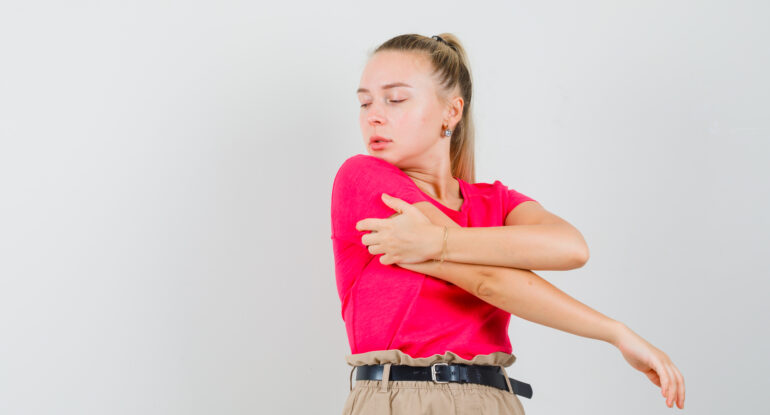Understanding the Shoulder Joint
The shoulder joint is unique in the human body, allowing for a wider range of motion than any other joint. This is because it is formed by a ball (head of the upper arm bone) articulating on a shallow cup (shoulder blade bone). This design enables the shoulder to move in virtually any plane of motion.
However, the trade-off for such mobility is reduced stability. To counter this, the shoulder relies on several supporting structures, including:
- The labrum – a rim of cartilage that deepens the shallow socket.
- Ligaments – connecting bones and limiting excessive movement.
- Rotator cuff muscles – a group of muscles and tendons that encircle the joint, providing stability and movement.
Why Does It Hurt When You Lift Your Arm?
Even with these supports, the shoulder’s remarkable range of motion makes it vulnerable to injury and wear and tear. Damage to its structures can cause shoulder pain and popping when lifting the arm, particularly during overhead movements.
Rotator cuff injury
The rotator cuff consists of muscles and tendons that stabilise and move the shoulder joint. These tendons may be injured in an acute incident, such as falling on an outstretched arm, or more commonly, through overuse.
The rotator cuff tendons pass through a narrow space under the collarbone (subacromial space). Over time, repetitive strain can lead to inflammation or fraying, resulting in pain. In some cases, you may also notice shoulder popping when rotating, a sign of tendon irritation or damage.
Frozen shoulder
Frozen shoulder develops when the capsule surrounding the shoulder joint becomes inflamed and thickened. This typically occurs in people aged 40 to 60, with women more commonly affected.
Early symptoms include pain at the front of the shoulder, which gradually progresses to stiffness, making it difficult to lift the arm above the head or reach behind the back. This condition can last up to three years but often responds well to treatment, especially if managed early.
Shoulder joint arthritis
Shoulder arthritis occurs when cartilage covering the joint surfaces of the shoulder blade bone (scapula) and upper arm bone (head of the humerus) degenerates. Loss of cartilage exposes bone endings, which contain nerve endings, leading to pain during movement. In more advanced stages, you might also hear or feel popping or grinding sensations in the joint.
Bursitis
Bursae are fluid-containing spaces that are found between tendons, muscles and bones. These fluid-filled spaces help to reduce friction between tendons and therefore reduce the wear and tear. Repetitive activity (eg throwing sports) can result in inflammation of the shoulder bursa, causing pain during overhead activities.
Labral tears
As mentioned earlier, the shoulder has two articulating surfaces – the shallow socket of the shoulder girdle and the round head of the upper arm bone. The socket is deepened by the labrum, a rim of cartilage that helps stabilise the joint. This cartilage can tear from repetitive overhead movements, a fall, or a direct blow, causing pain, clicking, or recurrent dislocation. Prompt treatment is key if you want to know how to fix shoulder popping and restore stability.
When to See a Doctor
Seek medical advice if you experience shoulder pain lasting more than a few days, weakness, or loss of motion. If you have had trauma, night pain, or difficulty lying on the affected side, an early evaluation at a pain management clinic is recommended.
Managing Shoulder Pain at Home
For mild, recent discomfort, you can try:
- Resting the shoulder.
- Applying ice to reduce inflammation.
- Taking over-the-counter pain relief (e.g., paracetamol or ibuprofen).
- Gentle stretching to maintain mobility.
However, if these activities do not result in an improvement in your shoulder pain, it is important to seek medical advice.
Don’t Let Shoulder Pain Slow You Down
Shoulder pain that lasts for more than a few days should not be ignored. Early diagnosis and treatment can prevent long-term damage and help you return to your normal activities. If you’re experiencing persistent discomfort, book a consultation to visit our pain clinic in Singapore so we can identify the cause and create a personalised plan to restore your shoulder health.


